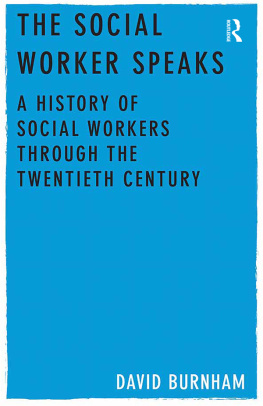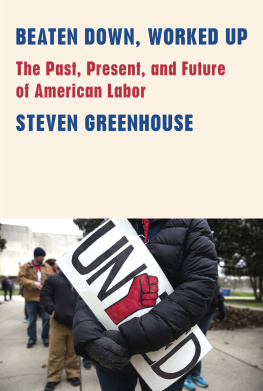JACQUES RANCIRE is Emeritus Professor of Philosophy at the University of Paris VIII. His books include The Politics of Aesthetics, On the Shores of Politics, The Future of the Image, Hatred of Democracy and The Emancipated Spectator.
This updated edition first published by Verso 2012
Verso 2012
Translation of the preface to the new English-language edition David Fernbach 2012 First published in English by Temple University Press 1989 under the title Nights of Labor: The Workers Dream in Nineteenth-Century France
First published as La nuit des proltaires
Librairie Arthme Fayard 1981
All rights reserved
The moral rights of the authors have been asserted
Verso
UK: 6 Meard Street, London W1F 0EG
US: 20 Jay Street, Suite 1010, Brooklyn, NY 11201
www.versobooks.com
Verso is the imprint of New Left Books
eISBN (US): 978-1-84467-849-5
eISBN (UK): 978-1-78168-960-8
ISBN-13: 978-1-84467-778-8
British Library Cataloguing in Publication Data
A catalogue record for this book is available from the British Library
Library of Congress Cataloging-in-Publication Data
A catalog record for this book is available from the Library of Congress
v3.1
Preface to the New English Edition
The reader who discovers this book in the twelfth year of the twenty-first century may well ask what strange object she or he has in their hands. How can these stories about French locksmiths, tailors, shoemakers, and typographers from the nineteenth century interest anyone in the age of digital revolution, non-material production, and the globalized market? They would certainly not be the first to ask such a question. It was already the case with the French readers who opened this book when it was first published thirty years ago. At that time, however, there was no talk yet of globalization, nor indeed of the end of the proletariat, history, and utopias. Quite the contrary: France had just elected a Socialist government with Communist ministers, which openly claimed the legacy of Marxism and the working class. And it was in relation to this legacy that my book went against the current and seemed to be an unclassifiable object. Its author was a professional philosopher, whose work had begun in the 1960s, inspired by his participation in Louis Althussers theoretical enterprise, which sought to give Marxist theory a new foundation. Yet instead of advancing philosophical theses, he was telling stories of French workers in the nineteenth century. And, as for Marxism, he offered no analysis of industrial production and capitalist exploitation, nor of social theories and the struggles of working-class parties and unions. His workers, moreover, were not real workers; they were old-style artisans, dreamers who versified or invented philosophies, who met together in the evenings to set up short-lived magazines, enthused about socialist and communist utopias but generally did not get involved in putting these into practice. And the book seemed to lose its way on their wandering paths, following the reveries of one, the stories that others related in their diaries, the letters they exchanged that spoke of their Sunday walks in the Paris suburbs or the mundane concerns of those who left for the United States to realize their dream of a fraternal community. What could readers in 1980 make of all this?
The question, therefore, is not one of distance in time. If this book goes against the current now, in an age that proclaims the disappearance of the proletariat, it should be remembered that it also did so at a time that still upheld the consistency of a working class united by the condition of the factory and the science of capitalist production. We can simply say that it is untimely for a postmodern vision because it was already so for a classic modernist vision. It fails to chime with the belief, shared equally by modernism and postmodernism, in a straight line of history on which ruptures in the course of time are conceived as the work of time itself, of an overall temporal process that generates and suppresses successive forms of life, consciousness, and action. It rejects this idea of time, seeing it as always, beneath its apparent objectivity, a manner of putting things and beings in a hierarchical order, in their proper place. Belief in historical evolution, said Walter Benjamin, is the legitimization of the victors. For me it is the legitimization of the knowledge that dictates what is or is not important, what makes history or does not. This is how the social sciences declared these accounts of workers excursions lacking in historical importance, since they were far from the solid realities of the factory and organized struggle. By this token, they confirmed the social order that has always been constructed on the simple idea that the vocation of workers is to workgood progressive souls add: and to struggleand that they have no time to waste playing at flneurs, writers, or thinkers.
This book, in fact, reverses that idea of time. It sees the great modernist narratives, which outline the development of productive forces and class consciousness, as a way of diverting the inner energy of the very struggles to which they appeal, of attributing them once more to this time against which they rebelled. It sees here a way of securing the power of those who arrogate to themselves the view of the master over the historic process in which they declare others to be collectively enclosed. This declaration of enclosure and this position of mastery found their radical form in the Althusserian enterprise in which I participated. This described the agents of capitalist relations of production as necessarily caught in the mesh of the ideology produced by the system that kept them in their place. In other words, this enterprise itself enclosed them in a perfect circle, explaining that the dominated were maintained in their place by ignorance of the laws of domination. But it also explained that the place in which they found themselves prevented them from understanding the laws of this domination: they were dominated because they did not understand, and they did not understand because they were dominated. Which meant that all the efforts they made to struggle against domination were themselves blind, trapped by the dominant ideology, and that only scientists able to perceive the logic of this circle could lead them out of their subjection.
In France in 1968, it became forcefully apparent that this circle of domination was in fact the circle of this supposed science. It became apparent that subjection and rebellion had no other cause than themselves, and that the science that claimed to explain subjection and guide revolt was complicit in the dominant order. It was under the impact of this object lesson that I undertook in the 1970s the long research work in working-class archives that led to this book. Many surprises awaited me along the way. I set out looking for wild expressions of revolt, but I came across politely written texts requesting that workers be treated as equals, with a reasonable response to their reasoning. I went to consult the archives of a carpenter to find information about working conditions, and I came across letters from the 1830s in which this worker told a friend about a Sunday in May when he set out with two companions to enjoy the sunrise on the river, discuss metaphysics at an inn, and spend the rest of the day converting the diners at the next table to their own humanitarian and social gospel. I went on to read texts in which this same worker described an entire plan of life, a paradoxical countereconomy in which each article of the workers daily budget was scrutinized in an attempt to consume less and, by doing so, increase his independence and his ability to struggle against the commodity economy. Thanks to these texts and many others, it became apparent that workers had never needed the secrets of domination explained to them, as their problem was quite a different one. It was to withdraw themselves, intellectually and materially, from the forms by which this domination imprinted on their bodies, and imposed on their actions, modes of perception, attitudes, and a language. Be realistic, demand the impossible, the May 1968 demonstrators proclaimed. For the workers of the 1830s, the question was not to demand the impossible, but to realize it themselves, to take back the time that was refused them by educating their perceptions and their thought in order to free themselves in the very exercise of everyday work, or by winning from nightly rest the time to discuss, write, compose verses, or develop philosophies. These gains in time and freedom were not marginal phenomena or diversions in relation to the construction of the workers movement and its great objectives. They were the revolution, both discreet and radical, that made these possible, the work by which men and women wrenched themselves out of an identity formed by domination and asserted themselves as inhabitants with full rights of a common world, capable of all the refinement or all the asceticism that had previously been reserved for those classes relieved of the daily cares of work and bread.












